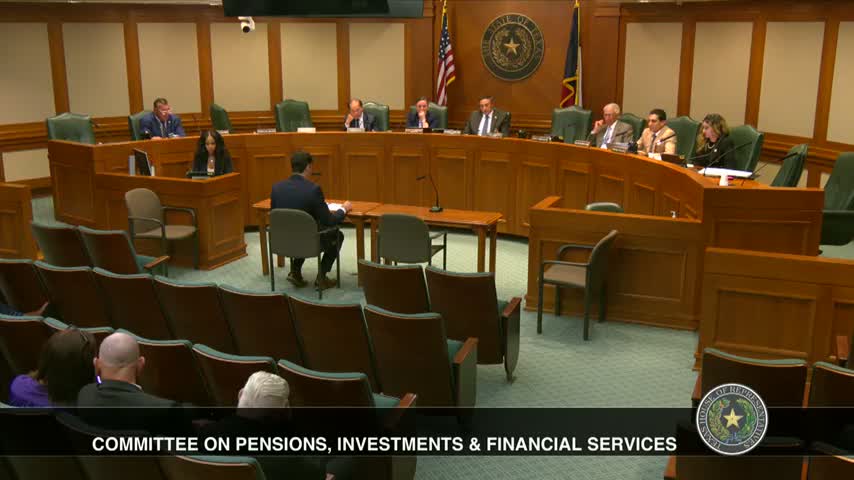Transparency Demands Rise Amid Pension Funding Crisis
September 19, 2024 | Committee on Pensions, Investments & Financial Services, HOUSE OF REPRESENTATIVES, Legislative, Texas
This article was created by AI summarizing key points discussed. AI makes mistakes, so for full details and context, please refer to the video of the full meeting. Please report any errors so we can fix them. Report an error »

During a recent government meeting, significant discussions centered on public pension systems, particularly focusing on transparency, funding adequacy, and the implications of environmental, social, and governance (ESG) policies.
A representative from a public policy think tank raised concerns about the increasing shift of public pension funds from public to private markets, which has led to a lack of transparency regarding investments. The speaker emphasized that as pension funds, such as the Teacher Retirement System (TRS), allocate nearly half of their assets to private investments, watchdogs lose visibility into how these funds are managed. They urged lawmakers to enhance transparency by requiring annual reports detailing commitments, distributions, and returns from private investments, similar to practices in states like Florida and California.
The meeting also highlighted the plight of retired educators, with Felicia Owens from the Texas State Teachers Association advocating for better cost-of-living adjustments (COLAs) for retirees. She pointed out that many retired educators still struggle financially, often living below the poverty line despite their years of service. Owens called for a commitment to ensure that future educators can retire with dignity, emphasizing the need for sustainable pension benefits.
The discussion shifted to the Dallas Police and Fire Pension, where representatives expressed frustration over the elimination of annual adjustments to benefits, which have not been increased for nearly eight years. James Eliston, president of the Dallas Police Retired Officers Association, highlighted the erosion of pension value due to inflation and the lack of adjustments compared to other city pension plans. He urged the committee to consider the long-term implications of these decisions on retirees' financial security.
Additionally, the meeting addressed the broader implications of pension funding strategies. Steven Gassenberger from the Reason Foundation pointed out that the current actuarial standards for pension funding in Texas are outdated, advocating for a more reasonable amortization period to ensure fiscal responsibility. He suggested that any new benefit increases should be carefully planned to avoid exacerbating existing unfunded liabilities.
Overall, the meeting underscored the urgent need for legislative action to improve transparency in pension fund management, ensure adequate funding for retirees, and address the long-term sustainability of public pension systems in Texas. The discussions reflect a growing recognition of the challenges faced by public employees and the importance of maintaining robust pension systems to support them in retirement.
A representative from a public policy think tank raised concerns about the increasing shift of public pension funds from public to private markets, which has led to a lack of transparency regarding investments. The speaker emphasized that as pension funds, such as the Teacher Retirement System (TRS), allocate nearly half of their assets to private investments, watchdogs lose visibility into how these funds are managed. They urged lawmakers to enhance transparency by requiring annual reports detailing commitments, distributions, and returns from private investments, similar to practices in states like Florida and California.
The meeting also highlighted the plight of retired educators, with Felicia Owens from the Texas State Teachers Association advocating for better cost-of-living adjustments (COLAs) for retirees. She pointed out that many retired educators still struggle financially, often living below the poverty line despite their years of service. Owens called for a commitment to ensure that future educators can retire with dignity, emphasizing the need for sustainable pension benefits.
The discussion shifted to the Dallas Police and Fire Pension, where representatives expressed frustration over the elimination of annual adjustments to benefits, which have not been increased for nearly eight years. James Eliston, president of the Dallas Police Retired Officers Association, highlighted the erosion of pension value due to inflation and the lack of adjustments compared to other city pension plans. He urged the committee to consider the long-term implications of these decisions on retirees' financial security.
Additionally, the meeting addressed the broader implications of pension funding strategies. Steven Gassenberger from the Reason Foundation pointed out that the current actuarial standards for pension funding in Texas are outdated, advocating for a more reasonable amortization period to ensure fiscal responsibility. He suggested that any new benefit increases should be carefully planned to avoid exacerbating existing unfunded liabilities.
Overall, the meeting underscored the urgent need for legislative action to improve transparency in pension fund management, ensure adequate funding for retirees, and address the long-term sustainability of public pension systems in Texas. The discussions reflect a growing recognition of the challenges faced by public employees and the importance of maintaining robust pension systems to support them in retirement.
View full meeting
This article is based on a recent meeting—watch the full video and explore the complete transcript for deeper insights into the discussion.
View full meeting
